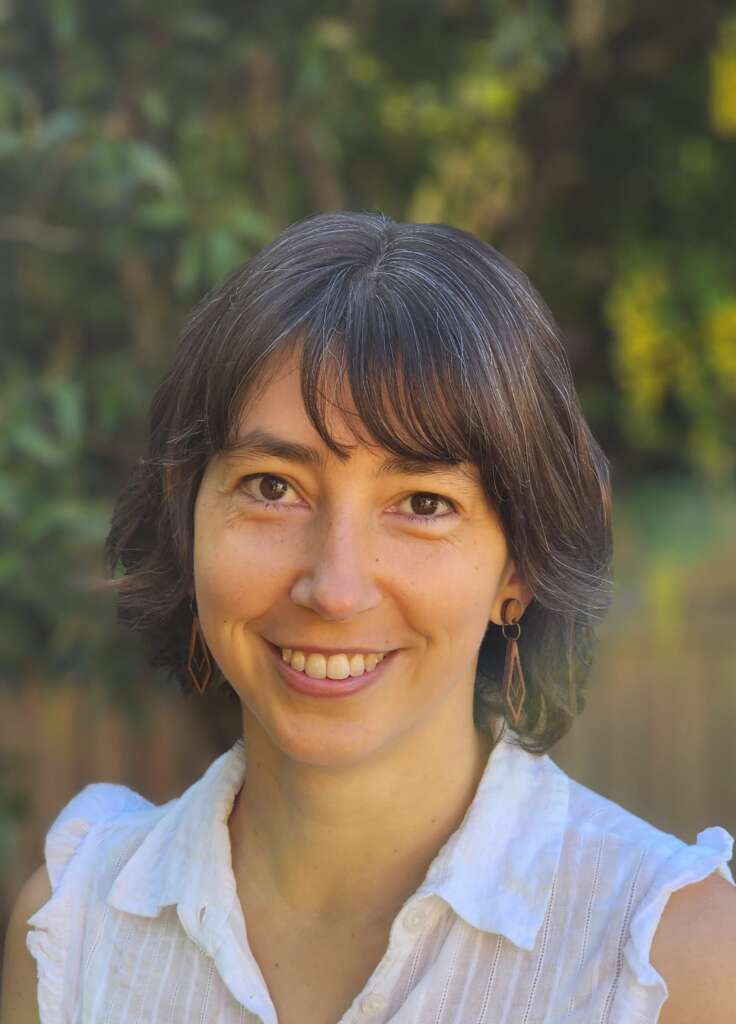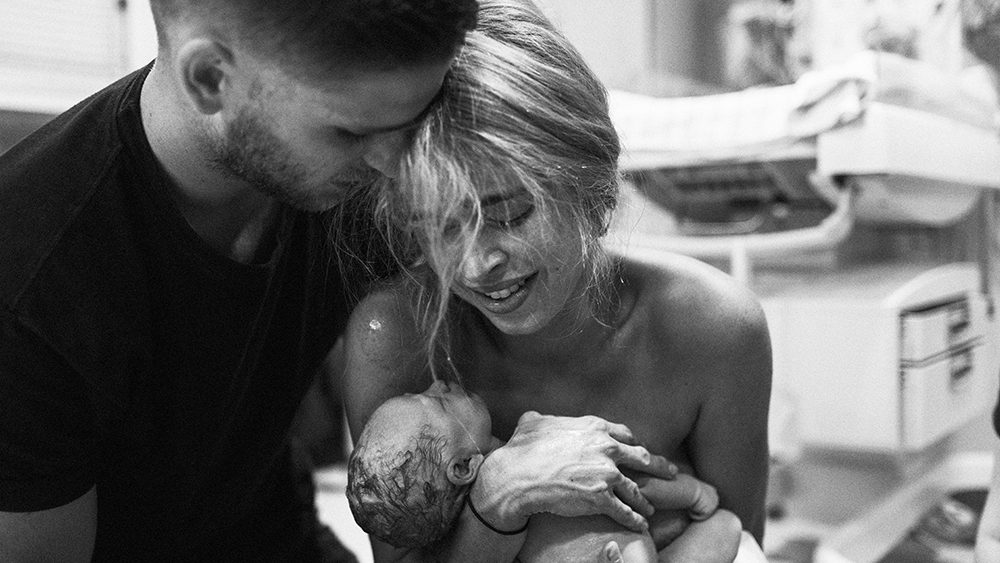Pregnancy and birth are such intensely powerful experiences that reading a book about it 33 years later makes my heart race.
For the child I gave birth to, witnessing his wife give birth sparked amazement that every single person in the world enters it like this, and opened up a newfound admiration for the strength and resilience of women.
Christian midwife Jodie McIver confesses that she was hesitant about having children, knowing the challenges it would entail, and her first experience of giving birth proved to be traumatic.
“Going through that first experience myself was very impacting,” she says. “I knew that these things could be hard for women. I’d watched it, but experiencing it yourself is very different,” she says. “The reality was just a blur and I was bit numb at the time.”
The beauty of this book is that it pairs powerful theological arguments for the goodness of giving birth.
Now a mother of three, Jodie has brought together the knowledge and wisdom from her twin careers in midwifery and ministry in her new book, Bringing Forth Life: God’s Purposes in Pregnancy and Birth, which has been shortlisted for the Sparklit Australian Christian Book of the Year 2023.
She has done all of us – new mothers and those supporting them – a great service. Even if you have never had children, you will learn how to value and support a new mother who is struggling with the emotional stretching and physical scars from bringing forth new life.
The beauty of this book is that it pairs powerful theological arguments for the goodness of giving birth – along with or even because of the pain involved – with practical advice on how to navigate a process where it’s easy to feel out of control and overpowered by medical experts.

Jodie McIver
For me, Jodie’s first notable insight was that a woman gives birth not only to a newborn baby but also a newborn mother and a newborn family. Given our physical and emotional limitations, it’s a tough developmental transition – technically, a matresence – but it’s made more difficult by some ideas promulgated in church circles.
“Some ideas we can receive in churches, as we look at particularly that Genesis 3 idea of bringing forth children with painful labour, our perspective and the way that’s framed, sometimes can be unhelpful– that in fact giving birth itself is a curse. So it’s rethinking all that and seeing, through my experiences as well, the goodness of birth and childbearing,” Jodie tells Eternity via Zoom.
“Absolutely the hardness, but how the hardness and the goodness can sit alongside each other – not just even sit alongside one another, but in God’s bigger picture, he brings forth life through pain himself in Jesus on the cross. There is a cost to bringing forth life into a broken world. That’s the reality for us as well, and that doesn’t take away from its goodness. These are powerful experiences that God works through. But that bigger picture helps reframe things for our own experiences.”
“Our bodies are not ornamental …” – Jodie McIver
In contrast to superficial body-positive movements, Jodie’s perspective on valuing the cost of bringing forth life is refreshing. She declares that “our bodies are not ornamental” – a revolutionary idea – and that the scars of giving birth do not signify a downgrade of our bodies but rather an upgrade.
“That’s so counter-cultural,” says Jodie. “In the culture more generally, a lot of people are trying to help women feel good about their bodies and what it has done through birth, but that kind of positive self-talk can be a little bit hollow. But looking at Jesus and the fact that he bears scars from giving new birth, for Christians, that’s quite a powerful revelation of the goodness of what we’re doing here and how these marks that persist are signs of an amazing, wonderful thing and are not something to be ashamed of. Jesus isn’t ashamed of his scars – he shows them to his disciples.”
In contrast to the impression that women are somehow second-best in God’s creation, Jodie writes that giving birth is a unique journey modelled on God’s pattern of creating new birth.
“These experiences, because they’re so uniquely female, haven’t always been talked about very much in church settings where men are doing much of the speaking. That’s a real loss for all of us, for men as well as women, because there’s a real significance in the fact that God gives us new birth and we give birth here. And that’s our way of grasping and understanding, and living out the reality of the gospel,” she says.
“It should be talked about more, by both men and women – even aside from personal experience. These are really significant events in the lives of our families, churches and the world.”
“There is a cost to bringing forth life into a broken world. That’s the reality for us as well, and that doesn’t take away from its goodness.”
Jodie had a unique introduction to the process of birth from early childhood, when her mother allowed her to witness the delivery of her two siblings.
“My birth had been relatively straightforward and a positive experience for them. So then when their next one was coming along, I think they just really wanted me to be able to share in that and have it as family experience,” she explains.
“I don’t know whether they also thought it would have a good impact on my relationship with my siblings, but I think it was trying to normalise this as part of family life.”
Studying psychology at uni, Jodie discovered a fascination with human biology and in particular, the reproductive system and how the female body worked. This led her into midwifery.
“That nudged me in a direction that I was much more drawn towards, working with women and families during pregnancy and birth and new parenthood, as opposed to nursing and caring for sick or injured people. So it was a positive and exciting idea.”
But Jodie soon experienced the tension between her midwifery career and Christian ministry.
“As soon as I finished school, I got involved in leading youth group and teaching Sunday school and those kinds of ministries, which I loved. I was still doing that, but obviously, shift work takes a toll on church involvement and regular attendance.
“So that was a bit hard. By that stage, I was also dating my husband who had just become a minister. So it felt like church ministry was going to be a big part of our lives if things progressed to marriage, as they did. I wanted to prioritise that more at that stage, so I decided to go to Bible college. I genuinely thought I was leaving midwifery behind at that point.
“I didn’t work as a midwife while I was studying for three years, and I didn’t envisage going back to it either. But I did in the end, alongside church ministry. So I was doing both things alongside one another for a time.”
She hopes women gain a sense of God’s purpose in what they’re going through as a mother and God’s child.
When she saw an advertisement for a fellowship with ADM (Anglican Deaconess Ministries), she put in her proposal for a book that would combine theological reflections on her own experiences as a mother and a midwife with research and the experiences of other women. This fellowship enabled her to spend a year writing the bulk of the book.
“I was mainly relooking at some of the key texts in the Bible about these kinds of things. Then also, it was such a privilege, when writing the book, I ended up including about a dozen other women’s stories, getting all their insights as well. That has made it all the richer because the reality of these experiences is they are so diverse, for better or worse.”
Jodie says her book tries to “bring all those things together, and highlight the spiritual, emotional, physical, all those different elements of these big transitions.”
She hopes her book will equip dads, other family members and anyone in pastoral care to support women who are going through pregnancy and birth, and help them navigate the practicalities and ethics of prenatal testing and medical intervention.
But more than that, she hopes women gain a sense of God’s purpose in what they’re going through as a mother and God’s child, and that this will help them get through the hard parts, as well as rejoice in the delights.
“I feel like sometimes this is where our womanhood really comes to the fore. We can avoid those things often up to that point. And some women, even some girls, feel like being a woman sucks and that’s very valid given many experiences that people have had,” she says.
“Sadly, sometimes it’s perpetuated in church settings as well. But having the sense that God doesn’t think that, that God values womanhood so highly, and in the birth process itself, it’s a privileged position he’s drawn us into, rather than a curse that we must endure. That’s a powerful privilege.”


